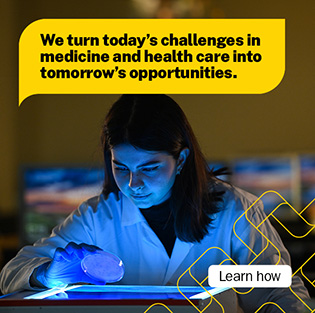We know that our health care system works for many — but not all.
With more than 30,000 children aged 16 years and younger without a primary care provider in Nova Scotia alone, and families from underrepresented or underserved communities who lack equitable resources, the health-care system is, in fact, not working for a significant portion of Maritime children.
 Researchers at şÚÁĎłÔąĎÍřare actively working to address these gaps and pioneering initiatives to generate positive health impacts on both a regional and national scale.
Researchers at şÚÁĎłÔąĎÍřare actively working to address these gaps and pioneering initiatives to generate positive health impacts on both a regional and national scale.
Dr. Andrew Lynk, chair and chief of pediatrics at Dalhousie’s Faculty of Medicine and the IWK Health Centre, is among them. He is working on a pilot project to introduce community pediatricians linked with clinical assistants to work in family medicine collaboratives.
“Fifteen per cent of children and adolescents in Nova Scotia are without a primary care home,” he says. “Especially children who face social determinants of health challenges, such as refugees and immigrants, Indigenous, African Nova Scotian, and children in care.”
In addition to the community pediatrician initiative, Dr Lynk has been part of a program that has seen all eight high schools in Cape Breton equip their youth health centres with nursing and physician services. He hopes to see this expand throughout the province. Â
Dr. Lynk is one of the panelists who will speak about the future of pediatric care at Dalhousie’s upcoming , happening on Feb. 21, 2024. The event will shed light on how şÚÁĎłÔąĎÍřis working to improve access to health care for children and families here in Nova Scotia, across the Maritimes, and nationally.
Aiming for equitable care
Shauna Hachey is an associate professor in Dalhousie’s School of Dental Hygiene and co-lead of the şÚÁĎłÔąĎÍřHealthy Populations Institute flagship project “Oral Health is Health.” She joins Dr. Lynk as a panelist. Like him, she recognizes disparities in healthcare, particularly in those underrepresented groups.
 “Dental conditions are the third most common condition associated with chronic childhood pain in First Nation communities,” she says. “They are experienced almost twice as often by First Nation children than Non-First Nation children in Atlantic Canada.”
“Dental conditions are the third most common condition associated with chronic childhood pain in First Nation communities,” she says. “They are experienced almost twice as often by First Nation children than Non-First Nation children in Atlantic Canada.”
Often resulting from dental decay, oral pain interferes with a child’s ability to learn, eat, sleep, grow and achieve healthy development. Studies have found rates of dental day surgery among children in regions populated with First Nations children to be five times higher than the rate among general pediatric population in Nova Scotia.
Shauna is part of a team who has developed “Weskewikwa’sit mijua’ji - Baby Smiles” (Baby Smiles), whose goal is to improve the oral health status of Mi’kmaw children by providing new parents with culturally relevant, evidence-based knowledge and the tools necessary to care for their child’s mouth and teeth.
At the heart of the initiative, which is an innovation of the , made up of the the five Unama’ki (Cape Breton) First Nations communities and their long-standing collaborators, Margot Latimer, Mary McNally and Shauna Hachey from şÚÁĎłÔąĎÍř, is a children’s book, Baby Smiles Weskewikwa’sit mijua’ji’j available in print and in open access digital and audiovisual formats on the website. The book conveys age-appropriate messaging to promote healthy habits from prebirth to adulthood. Currently, Baby Smiles Weskewikwa’sit mijua’ji’j is the only resource that incorporates Mi’kmaq language and culture into a broad spectrum of accessible and evidence-based oral health promotion activities focused on young children.Â
Cross-faculty focus and impact
Dr. Brenda Merritt, dean in the Faculty of Health, will serve as moderator of the upcoming Open Dialogue Live event. A national and international leader in health research and scholarship, Dal Health engages, explores, and educates to advance health, focusing on the entire health-care lifecycle — from pediatrics to seniors. Dr. Merritt recognizes the importance of access to care for pediatric patients.
“Our partnership with the IWK has led to the innovation clinical placements and hand-on learning experiences our students receive, as well as our research,” she says. “Providing better access to health care for all children in our communities is a top priority as we inspire the next generation.”
Joining Dr. Lynk and Shauna Hachey on the panel are Dr. Sarah Moore, an assistant professor in the School of Health and Human Performance at Dal, and Karlee Francis, health director, Eskasoni First Nation.
, happens Wednesday, February 21, 2024, from 6:30pm-7:30pm at the Sir Charles Tupper Medical Building, Theatre B, 5850 College Street, Halifax. It will simultaneously be streamed online. but required for both in-person and online attendance.
Recommended reading: Message service helps burned-out doctors and trainees

